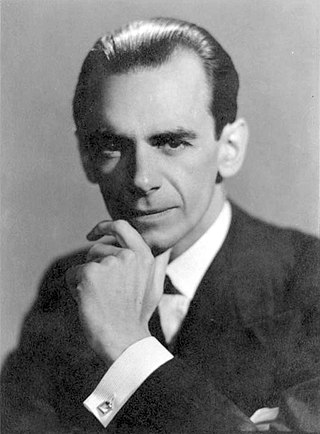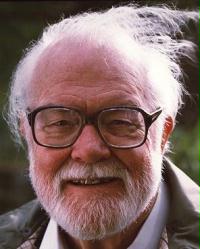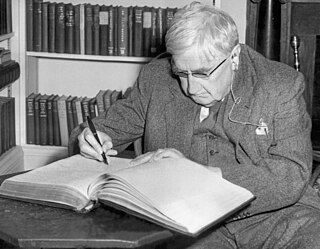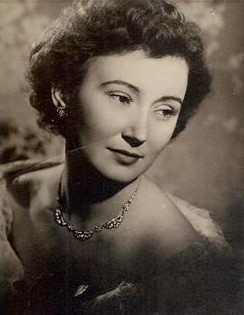Related Research Articles

Gustav Theodore Holst was an English composer, arranger and teacher. Best known for his orchestral suite The Planets, he composed many other works across a range of genres, although none achieved comparable success. His distinctive compositional style was the product of many influences, Richard Wagner and Richard Strauss being most crucial early in his development. The subsequent inspiration of the English folksong revival of the early 20th century, and the example of such rising modern composers as Maurice Ravel, led Holst to develop and refine an individual style.

Edward Benjamin Britten, Baron Britten was an English composer, conductor, and pianist. He was a central figure of 20th-century British music, with a range of works including opera, other vocal music, orchestral and chamber pieces. His best-known works include the opera Peter Grimes (1945), the War Requiem (1962) and the orchestral showpiece The Young Person's Guide to the Orchestra (1945).

Ralph Vaughan Williams, was an English composer. His works include operas, ballets, chamber music, secular and religious vocal pieces and orchestral compositions including nine symphonies, written over sixty years. Strongly influenced by Tudor music and English folk-song, his output marked a decisive break in British music from its German-dominated style of the 19th century.

Sir Harold Malcolm Watts Sargent was an English conductor, organist and composer widely regarded as Britain's leading conductor of choral works. The musical ensembles with which he was associated included the Ballets Russes, the Huddersfield Choral Society, the Royal Choral Society, the D'Oyly Carte Opera Company, and the London Philharmonic, Hallé, Liverpool Philharmonic, BBC Symphony and Royal Philharmonic orchestras. Sargent was held in high esteem by choirs and instrumental soloists, but because of his high standards and a statement that he made in a 1936 interview disputing musicians' rights to tenure, his relationship with orchestral players was often uneasy. Despite this, he was co-founder of the London Philharmonic, was the first conductor of the Liverpool Philharmonic as a full-time ensemble, and played an important part in saving the Royal Philharmonic Orchestra from disbandment in the 1960s.
English composer Ralph Vaughan Williams wrote his Symphony No. 5 in D major between 1938 and 1943. In style it represents a shift away from the violent dissonance of his Fourth Symphony, and a return to the gentler style of the earlier Pastoral Symphony.

Sir Charles Barnard Groves CBE was an English conductor. He was known for the breadth of his repertoire and for encouraging contemporary composers and young conductors.
Fritz Bennicke Hart was an English composer, conductor, teacher and unpublished novelist, who spent considerable periods in Australia and Hawaii.

A Sea Symphony is an hour-long work for soprano, baritone, chorus and large orchestra written by Ralph Vaughan Williams between 1903 and 1909. The first and longest of his nine symphonies, it was first performed at the Leeds Festival in 1910 with the composer conducting, and its maturity belies the relatively young age — thirty — when he began sketching it. Moreover it is one of the first symphonies in which a chorus is used throughout as an integral part of the texture and it helped set the stage for a new era of symphonic and choral music in Britain during the first half of the 20th century. It was never numbered.
Hugh the Drover is an opera in two acts by Ralph Vaughan Williams to an original English libretto by Harold Child. The work has set numbers with recitatives. It has been described as a modern example of a ballad opera. Contemporary comment noted the use of humour and the role of the chorus in the work, in the context of developing English opera.
The Pilgrim's Progress is an opera by Ralph Vaughan Williams, based on John Bunyan's 1678 allegory The Pilgrim's Progress. The composer himself described the work as a 'Morality' rather than an opera. Nonetheless, he intended the work to be performed on stage, rather than in a church or cathedral. Vaughan Williams himself prepared the libretto, with interpolations from the Bible and also text from his second wife, Ursula Wood. His changes to the story included altering the name of the central character from 'Christian' to 'Pilgrim', so as to universalise the spiritual message.

Ralph Vaughan Williams's Symphony No. 8 in D minor was composed between 1953 and 1955. Sir John Barbirolli, its dedicatee, conducted the Hallé Orchestra in the premiere at the Free Trade Hall in Manchester on 2 May 1956. It is the shortest of the composer's nine symphonies, and is mostly buoyant and optimistic in tone.
The Concerto in F Minor for Bass Tuba and Orchestra by British composer Ralph Vaughan Williams was written in 1954 for Philip Catelinet, principal tubist of the London Symphony Orchestra (LSO), who together gave the premiere on 13 June 1954 with Sir John Barbirolli conducting. The same musicians made the work’s first recording that same year. This concerto was the first concerto written for solo tuba.
Job: A Masque for Dancing is a one act ballet produced for the Vic-Wells Ballet in 1931. Regarded as a crucial work in the development of British ballet, Job was the first ballet to be produced by an entirely British creative team. The original concept and libretto for the ballet was proposed by the scholar Geoffrey Keynes, with choreography by Ninette de Valois, music by Ralph Vaughan Williams, orchestrations by Constant Lambert and designs by Gwendolen Raverat. The ballet is based on the Book of Job from the Hebrew Bible and was inspired by the illustrated edition by William Blake, published in 1826. Job had its world premiere on 5 July 1931, and was performed for members of the Camargo Society at the Cambridge Theatre, London. The first public performance of the ballet took place on 22 September 1931 at the Old Vic Theatre.

Riders to the Sea is a play written by Irish Literary Renaissance playwright John Millington Synge. It was first performed on 25 February 1904 at the Molesworth Hall, Dublin, by the Irish National Theater Society with Helen Laird playing Maurya. A one-act tragedy, the play is set at Inishmaan in the Aran Islands, and like all of Synge's plays it is noted for capturing the poetic dialogue of rural Ireland. The plot is based not on the traditional conflict of human wills but on the hopeless struggle of a people against the impersonal but relentless cruelty of the sea.

An Oxford Elegy is a work for narrator, small mixed chorus and small orchestra, written by Ralph Vaughan Williams between 1947 and 1949. It uses portions of two poems by Matthew Arnold, "The Scholar Gipsy" and "Thyrsis". The first performance took place privately, whilst the public premiere took place in Oxford in June 1952, with Steuart Wilson as the speaker and Bernard Rose conductor.

Sāvitri is a chamber opera in one act with music composed by Gustav Holst, his Opus 25, to his own libretto. The story is based on the episode of Savitri and Satyavan from the Mahābhārata, which was also included in Specimens of Old Indian Poetry and Idylls from the Sanskrit. The opera features three solo singers, a wordless female chorus, and a chamber orchestra of 12 musicians. Holst had made at least six earlier attempts at composing opera before arriving at Sāvitri.

Edward Geoffrey Toye, known as Geoffrey Toye, was an English conductor, composer and opera producer.
Hugh Ottaway was a prominent British writer and lecturer on classical music.
Riders to the Sea is a British short film, shot in 1935 in Ireland. It is based on 1904 play of the same name, written by John Millington Synge. It was directed by Brian Desmond Hurst with Sara Allgood and Denis Johnston in the title roles.

Iris Victoria Kells was an English operatic soprano. She played leading roles in the 1960s at Sadler's Wells Opera.
References
Notes
- ↑ Ottaway, Hugh,"Riders to the Sea", The Musical Times, August 1952, pp. 358–360 (subscription required)
- ↑ Chissell, Joan. "Opera in London: Sadler's Wells – Riders to the Sea", The Musical Times , August 1953, pp. 372–373 (subscription required)
- 1 2 Ottaway, Hugh, "Riders to the Sea", The Musical Times, January 1973, p. 45 (subscription required)
- ↑ Rubbra, Edmund, "The Later Vaughan Williams". Music & Letters , January 1937, pp. 1–8 (subscription required)
- ↑ Kennedy, Michael. "The Unknown Vaughan Williams", Proceedings of the Royal Musical Association, 1972–1973, p. 32 (subscription required)
- ↑ Shannon, Caireann. "The Duty of Words to Music: Ralph Vaughan Williams's Riders to the Sea", The Musicology Review (2), 2005–06